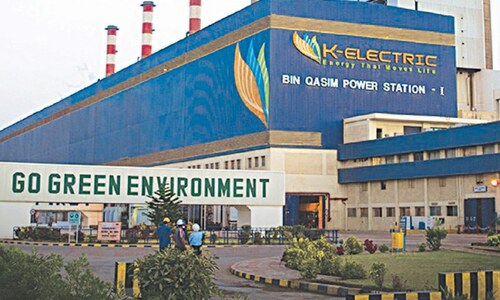• Increase to ensure Rs3.8tr funding for distribution companies, boost revenue by Rs485bn
• Average national tariff to cross Rs70 per unit after including surcharges, taxes, duties, etc
ISLAMABAD: The National Electric Power Regulatory Authority (Nepra) on Friday announced an increase of almost 20 per cent in the uniform national tariff to ensure about Rs3.8 trillion in funding for the 10 ex-Wapda electricity distribution companies (Discos) during the fiscal year 2024-25.
The Rs5.72 per unit increase, which will come into force from July 1 after formal notification by the government, would provide Rs485bn in additional revenue to Discos and strengthen the government’s position in securing an IMF bailout in July.
The government has the power to make adjustments with different rates of increases for various consumer categories through a cross-subsidy but without affecting the overall revenue requirement determined by the regulator.
The average national base tariff, including for K-Electric, is now set at Rs35.50 per unit (kilowatt-hour, or kWh) for the next fiscal year against Rs27.78 for the current year. This would yield about Rs3.763tr in revenue to 10 Discos in 2024-25 against Rs3.28tr this year.
After the addition of 18pc general sales tax, the average base tariff for next year would jump to Rs42 per unit excluding other taxes, duties and surcharges and put an additional burden of about Rs580bn on Discos’ consumers. This figure does not account for the impact on K-Electric, although Discos’ tariff also applies to Karachi, nor does it include any adjustments related to monthly fuel and quarterly tariff adjustments.
As such, the average national tariff is expected to be much higher for consumers than the industrial sector, for which the prime minister on Friday announced a Rs10.69 per unit cut, with a negative revenue impact of Rs200bn. This amount would now stand transferred to domestic, commercial, bulk power consumers, etc.
Under the procedure, the power division, after the approval of the federal cabinet, would file a follow-up tariff table to Nepra for subsidy punching for various consumer categories and slabs before a formal notification with effect from July 1, as already committed to the International Monetary Fund (IMF).
In a series of a determinations released on Friday, Nepra not only worked the revenue requirements of all the distribution companies separately for the next year, but it also calculated the average power purchase price on a countrywide basis.
According to Nepra, the power purchase price (PPP), which accounts for almost 90pc of power tariff, for Discos in 2024-25 (after excluding the share of K-Electric) “works out as Rs3,277.506 billion, which includes Rs1,161.257bn for fuel and variable O&M (operation and maintenance) costs and Rs2,116.25bn as capacity charges”, including the use of service charges, market operator fee, etc.
“Thus, the capacity charges work out as around 65pc of the total projected PPP of XWDISCOs, whereas energy cost is around 35pc of the total projected PPP,” Nepra said.
In terms of the average per-unit power purchase price of Discos on a unit-purchased basis — i.e. before the adjustment of allowed T&D (transmission and despatch) losses of Discos — capacity charges work out as Rs17.66 per unit, whereas energy charges are Rs9.69 per unit, totalling Rs27.35 per unit for 2024-25, Nepra said. The national average power purchase price works out at Rs27 per unit.
After adding losses and distribution margins, the average tariff goes up to Rs35.50 per unit. The increase was necessitated mainly because of the rupee’s devaluation, high inflation, exorbitant interest rates, addition of new capacities and overall low sales growth, the regulator said.
Real applicable average tariff
An official said the real applicable average national tariff would now stand between Rs65 and 72 per unit after inclusion of surcharges, taxes, duties and levies besides monthly and quarterly adjustments.
This was one of the key requirements of the upcoming bailout of the IMF to ensure further progress on structural reforms, particularly with regard to the energy sector’s viability and governance of state-owned enterprises.
Last year, too, the government enhanced the national uniform electricity tariff by an average of Rs5 per unit, involving an additional financial impact of Rs477bn and Rs7.91 per unit in 2022-23 with Rs893bn impact on consumers. No wonder then the electricity consumption dropped by 7-13pc.
Although K-Electric was not part of the tariff-setting exercise for Discos, the same rate would ultimately apply to its consumers owing to a uniform base rate applicable across the country.
Published in Dawn, June 15th, 2024














































